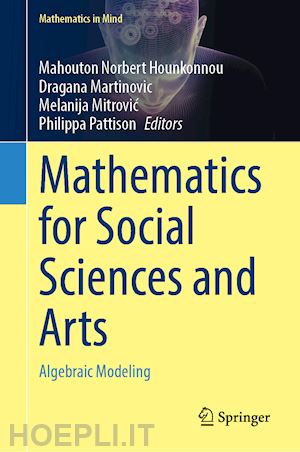
Questo prodotto usufruisce delle SPEDIZIONI GRATIS
selezionando l'opzione Corriere Veloce in fase di ordine.
Pagabile anche con Carta della cultura giovani e del merito, 18App Bonus Cultura e Carta del Docente
Mahouton Norbert Hounkonnou is a Full Professor at the University of Abomey-Calavi, Benin. His works deal with noncommutative and nonlinear mathematics, mathematical physics and complexity. He was a member of UNESCO Scientific Council for International Basic Sciences Programme and member of the InterAcademy Partnership (IAP) working group on Harnessing Science, Engineering and Medicine to Address Africa’s Challenges. He is also a member of several academies, including the Academy of Science of South Africa, Hassan II Academy of Science and Technology, Morocco, African Academy of Sciences, The World Academy of Sciences. He is the co- chair of the Network of African, European and Mediterranean Academies for Science Education, President of the Network of African Science Academies and former President of Benin National Academy of Sciences, Arts and Letters. He is member of the IAP Science Education Global Council, and representative for Africa of the International Mathematical Union (IMU) Commission for Developing Countries (CDC). He was awarded several international prestigious Prizes, the last being the American Institute of Physics 2023 Tate Medal for his efforts to build and maintain an enduring transnational African mathematical physics research and education community.
Dr. Dragana Martinovic is Professor Emerita at Faculty of Education, University of Windsor. She is a Fellow of the Fields Institute for Research in Mathematical Sciences and a Co-Director of the Fields Centre for Mathematics Education. She is a founding and current Co-Editor of the Springer book series, Mathematics Education in the Digital Era. Dragana serves on the Editorial Boards for Brill’sStudies in Mathematics in the Arts and Humanities book series, Springer’s Mathematics in Mind book series, and journals such as Participatory Educational Research (PER) and Semiotica. Dragana is also the Chair of the GeoGebra Institute of Canada/Institut de GeoGebra du Canada (GIC-IGC). Dragana has co-chaired various national and international conferences. In her research, Dragana explores knowledge for teaching mathematics, ways in which technology can assist in teaching and learning of mathematics, and epistemologies of Science, Mathematics, Engineering, and Mathematics (STEM) in relation to teacher and K–12 education. Dragana’s research is funded by SSHRC, KNAER, the Fields Institute, and various Canadian government organizations. She has published edited books and books of conference proceedings and multiple book chapters, refereed journal papers, and research and technical reports.
Melanija Mitrovic is a Full Professor at the University of Niš, Serbia, having received her PhD degree at the same university. She works in the field of classical and constructive algebra. Her innovating work within the theory of constructive binary structures with apartness positions her among the pioneers of constructive mathematics in Serbia. She develops interdisciplinary research investigating applications of algebraic structures to problems in engineering space, social sciences and humanities. She is, also, the Head of the Center of Applied Mathematics of the Faculty of Mechanical Engineering Niš, CAM- FMEN (since 2019), a member of the Editorial Board of Mathematics in Mind, Springer; a member of the Fields Cognitive Science Network. She holds the status of Permanent Full Professor at the International Chair in Mathematical Physics and Applications (ICMPA-UNESCO Chair), University of Abomey-Calavi, Benin Republic. She has held visiting professor positions at Linköping University and Malardaren University, Sweden; Bar-Ilan University, Israel; TU Wien, Austria; UTAD and University of Minho, Portugal; and Politecnico di Milano, Italy. She is member of the Grant Selection Committee (GSC) of the International Mathematical Union (IMU) Commission for Developing Countries (CDC).
Philippa (Pip) Pattison is an Emeritus Professor at the University of Melbourne and University of Sydney, having retired in 2021 as Deputy Vice-Chancellor Education at the University of Sydney. Pip’s research is focussed primarily on the development of mathematical and statistical models for social networks and network processes. Following early work on algebraic models for social networks, she developed in collaboration with others a hierarchy of statistical models for social networks that recognise the potential endogeneity of network processes and can reproduce a wide variety of their observed characteristics. She and her colleagues have extended these models to a variety of data structures and forms and have developed methods for estimating models from partial network data resulting from snowball sampling designs. These developments are now being widely applied across a number of social and behavioural science domains. Pip’s work has attracted a number of awards, including the











Il sito utilizza cookie ed altri strumenti di tracciamento che raccolgono informazioni dal dispositivo dell’utente. Oltre ai cookie tecnici ed analitici aggregati, strettamente necessari per il funzionamento di questo sito web, previo consenso dell’utente possono essere installati cookie di profilazione e marketing e cookie dei social media. Cliccando su “Accetto tutti i cookie” saranno attivate tutte le categorie di cookie. Per accettare solo deterninate categorie di cookie, cliccare invece su “Impostazioni cookie”. Chiudendo il banner o continuando a navigare saranno installati solo cookie tecnici. Per maggiori dettagli, consultare la Cookie Policy.